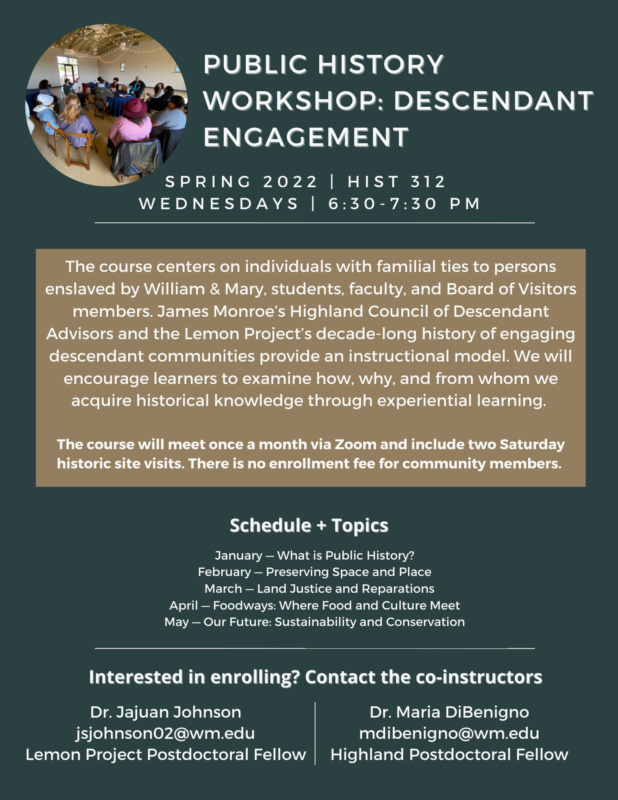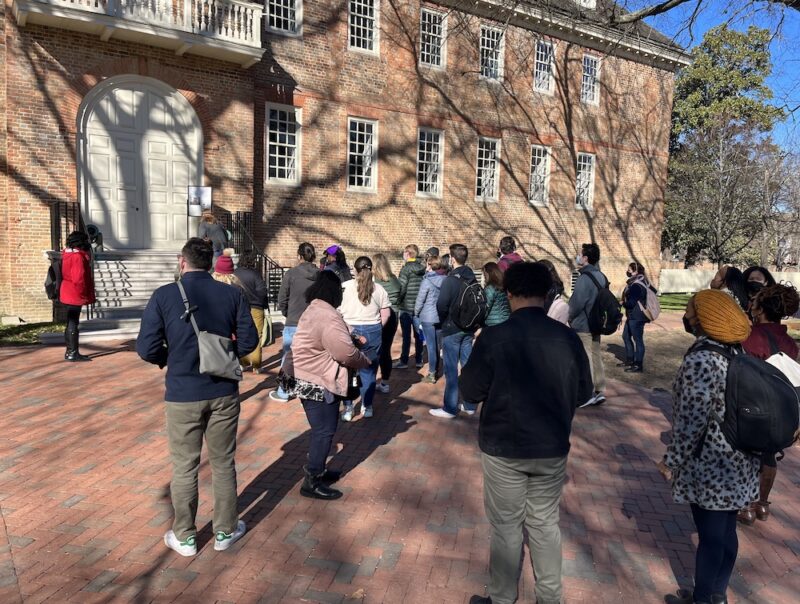Shared Work: William & Mary’s Highland and The Lemon Project
15 March 2022 – Maria DiBenigno and Jajuan Johnson
African American history, campus history, social justice, public engagement, community history, digital history, interpretation, collaboration, museums
William & Mary (W&M) is home to several institutes, programs, projects, and places of public history and community engagement that support the university’s mission of inclusivity and partnership. Many of these sites partnered in W&M’s Andrew W. Mellon Foundation-funded grant, Sharing Authority to Remember and Re-Interpret the Past. With this funding opportunity, W&M’s multi-site collaboration might offer a model for public history moving forward that emphasizes shared authority and resources including community-engaged curriculum development, equity-driven research, and creation of digital archives.
From 2019 to 2024, this pan-university initiative examines the legacies of enslavement and racial inequity in Virginia. W&M’s Highland, a historic site located in Charlottesville, Virginia, and The Lemon Project: A Journey of Reconciliation, an on-campus directive that addresses the wrongs committed by W&M against African Americans throughout its history, are two sites where W&M shares authority with community and descendant partners. We also engage in this shared work as postdoctoral fellows for Highland and the Lemon Project.
This principle recognizes the criticality of descendant voices in producing richer historical narratives. It also centers community research needs over the university’s priorities. During this extended time of pandemic, racial, social, and political unrest, interpreting history using shared authority is a useful tool for productive engagement.

Public History Workshop: Descendant Engagement course flyer, Spring 2022. Image credit: Maria DiBenigno and Jajuan Johnson
In our shared work, we unite on course development and community engagement. We are currently co-instructing our third course together, “Public History Workshop: Descendant Engagement,” after teaching “Community Laboratory: William & Mary’s Highland” in Spring 2021 and “African American Studies Research Methods and Resources” in Fall 2021. These courses are popular and successful due to shared resources and authority. Using the Engaging Descendant Communities Rubric, we show our undergraduate students the appropriate steps for successful and sustained engagement. We are privileged to enroll community members from Virginia and the District of Columbia in our courses. They also help to co-instruct through their personal archives, lived experiences, and professional training as oral historians, genealogists, community historians, and museum administrators. As fellows, we are focused on training future public historians (broadly defined—we have students from the sciences, humanities, and social sciences) in anti-racist, equity-driven research.
In our separate work, we are also engaged in shared authority. At Highland, we are currently re-interpreting our historic buildings to more accurately depict the site based on recent research efforts and tell a more inclusive, active, and polyvocal narrative about early nineteenth-century life. Despite its distance from the main campus in Williamsburg, Highland remains vital in the university’s commitment to inclusivity, mentorship, and collaboration. Though the site is notable for its association with James Monroe, it is also a place for ongoing community conversations about conservation, sustainability, food history, and the historic impact of land acquisition and dispossession on indigenous, free, and enslaved populations.
We do this work alongside the Highland Council of Descendant Advisors, ten individuals who descend from enslaved individuals and embody familial ties that cross generations. The Council members advise Highland staff on exhibit content and community outreach; they also work with our W&M community—faculty, staff, students, administrators—to better connect the past with the present and the future. All of these stakeholders inform our interpretative directions. Highland’s re-interpretation is happening within a broader discussion about how museums incorporate more diverse perspectives from past and present and address their institutional genealogies.
The Lemon Project: A Journey of Reconciliation uses a community-based participatory approach to find enslaved, free, freed persons, and their descendants using genealogical research to build on the project’s mission to center community voices in both narrative and research outcomes. The Lemon Project was established in 2009 after students and faculty insisted on a full investigation into W&M’s past. W&M’s Board of Visitors acknowledged that the university had “owned and exploited slave labor from its founding to the Civil War; and that it had failed to take a stand against segregation during the Jim Crow Era.” The community bridge-building initiatives of this project, such as the first Summer Sankofa Genealogical Workshop series, which convened local family historians and genealogists, encourage scholarship on the 300-year relationship between African Americans and W&M while engaging with descendants in the Virginia Tidewater region.

W&M students, faculty, and community members visit the Wren—or College—Building on W&M’s Historic Campus. Photo credit: Maria DiBenigno
In our shared work, our multi-disciplinary approach to research, teaching, and outreach warrants consistent assessment in tandem with students, community groups, faculty, and administrators to ensure equity in the process of crafting a more inclusive narrative of W&M’s history. In the Engaging Descendant Communities Rubric, Dr. Michael Blakey, an anthropology professor at William & Mary and expert on community-centric research, reminds us that our engagement methodology is “built for climbing, not resting.” Our work is not static. It should consistently improve by listening keenly and prudently responding to the priorities of descendant communities, practicing transformative pedagogical models, and building diverse partnerships to reinterpret the past rightly.
~Mariaelena DiBenigno is the Mellon Postdoctoral Research Fellow at William & Mary’s Highland in Charlottesville, Virginia. She received her PhD from W&M where she co-instructs courses, works on Highland’s new exhibits, and engages with communities in central and eastern Virginia. Her research interests include institutional histories at historic house museums and how popular culture engages with and/or influences our understanding of the past.
~Jajuan S. Johnson is the Mellon Postdoctoral Fellow at William & Mary’s Lemon Project in Williamsburg, Virginia, where he co-instructs, leads a research project to find descendants of people enslaved by W&M, and engages with communities in the Virginia Tidewater area. His research focuses on Black placemaking and racially motivated attacks on African American cultural sites in the twentieth century. Follow him on Twitter @drjajuan.



